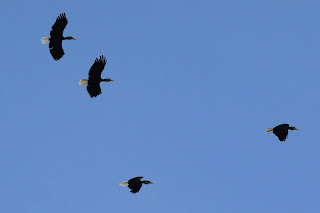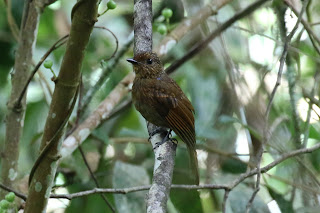After some research, I chose to stay at Stephen's Place, a great little affordable bed and breakfast located on the Telecom Loop above Fraser's Hill. Stephen was a former wildlife cinematographer for the BBC and is a great host full of fascinating stories. His b&b is up in the cloud forest, away from the sometimes noisy tourists of Fraser's Hill and makes a great base for exploring the area.
I arrived at the airport in Kualalumpur in the evening and was met by Stephen's neighbor, Dave the Canadian, who drove me through the darkness to the lodge. I woke up early to a cool misty morning. Stephen had some moth lights set up as he does most nights and there was still some around. He does a lot of macro photography and has found some amazing moths in the past. I forgot the name of this big common one.
My first lifers came easy as they preyed on the nocturnal insects attracted to the lights. Here's a Chestnut-capped Laughingthrush and a Silver-eared Mesia.
More life birds were found as the day slowly brightened. This Black-throated Sunbird worked the flowers.
Long-tailed Sibias came in to take yesterday's leftover bread at a feeding station.
A lesser Racket-tailed Drongo sat in the rain that would plague me all morning. It made for tough photography.
I'm not sure how this Gray-chinned Minivet is different from the Fiery Minivets I have seen in Palawan. But it's the one they get at Fraser's Hill.
I really loved the cool Streaked Spiderhunters. This one was feeding on a weird banana flower.
Black-crested Bulbul is a pretty common bird in southeast Asia.
Mountain Fluvettas were common but hard to photograph and there were little things flitting up high that I had to leave unidentified. But then about halfway around the loop I found a bird that I badly wanted to see, a male Red-headed Trogon. Best trogon I've ever seen.
Then I found a little flock of Black Laughingthrushes but this was the best photo I could come up with.
More hard to photograph stuff included Golden Babblers and Chestnut-crowned Warblers. Then I got a cooperative White-browed Shrike-babbler. The babblers of the Old World are much like the antbirds of the new world in so much as they have radiated structurally to adapt to different niches much like birds of other families have. So with a strong predatory bill similar to shrikes of the family Laniidae, there are antshrikes in the New World tropics and and shrike-babblers in Southeast Asia.
Black-browded Barbets were common and I got a good shot of this one investigating a cavity.
Eventually I circled the Telecom Loop and arrived back at Stephen's Place just in time for a little afternoon nap. I was laying there enjoying the comfortable bed when I heard the "poop-poop-poop" of a Collared Owlet calling outside. I ran outside and imitated the call just like I would that of our Ferruginous Pygmy-Owls. In fact the two species are both in the genus Gluacidium. And the bird flew in for photos.
I called Stephen outside and he was excited to get some photos. And I was happy to earn a little "street cred" from the accomplished wildlife photographer.






































































